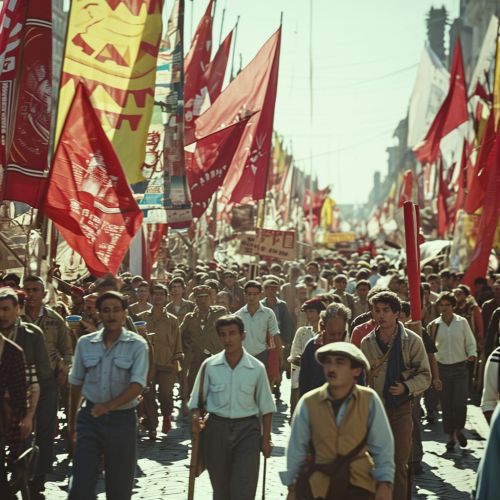International Workers' Day
Origins
International Workers' Day, also known as Labour Day or May Day, is a celebration of labourers and the working classes that is promoted by the international labour movement, socialists, and communists. The day, May 1, was chosen as International Workers' Day by the Second International Congress of socialists in Paris in 1889 to commemorate the Haymarket affair, which occurred in Chicago, United States, on 4 May 1886.


The Haymarket affair was the aftermath of a bombing that took place at a labour demonstration on Tuesday, May 4, 1886, at Haymarket Square in Chicago. It began as a peaceful rally in support of workers striking for an eight-hour workday and in reaction to the killing of several workers by the police the previous day. An unknown person threw a dynamite bomb at the police as they acted to disperse the public meeting. The bomb blast and ensuing gunfire resulted in the deaths of seven police officers and at least four civilians; scores of others were wounded.
Recognition and Celebration
International Workers' Day is a statutory holiday in many countries, although this is not the case everywhere. Some countries celebrate a Labour Day on other dates significant to them, such as the United States, which celebrates Labor Day on the first Monday of September.
In countries where International Workers' Day is a statutory holiday, it is customary for workers and their trade unions to organise parades or demonstrations to promote workers' rights. In some countries, the day has lost its original meaning and the holiday has become a time for general celebrations of the spring season.
Historical Significance
The date of May 1 was chosen to be International Workers' Day in order to commemorate the Haymarket affair in Chicago. The police were trying to disperse a public assembly during a general strike for the eight-hour workday when an unidentified person threw a bomb at them. The police responded by firing on the workers, killing four demonstrators.
In memory of those who lost their lives in the Haymarket affair, May 1 was declared International Workers' Day by the International's second congress in 1889. The resolution was passed in memory of the "martyrs of Chicago".
Modern Observances
Today, International Workers' Day is a major holiday in many countries, with workers and their trade unions organising marches and demonstrations in cities around the world. In some countries, such as Russia and China, the day has become a significant state holiday, with military parades and large public gatherings.
In other countries, such as the United States and Canada, the holiday is not officially recognised, and workers and their trade unions often organise protests and demonstrations to demand better working conditions and workers' rights.
